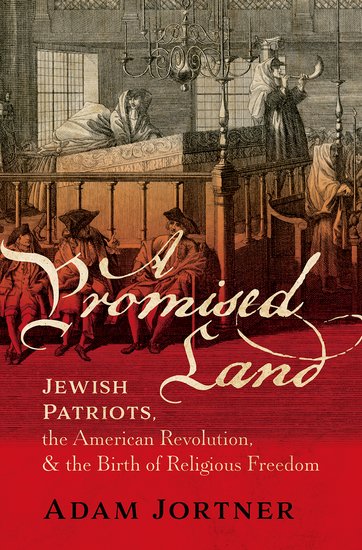Numbers are less compelling than stories as points of historical departure, but here is an exception: by the end of the American Revolution, 1000 Jews (out of a total population of approximately 2500 in North America) were living in or had just moved to Philadelphia. In A Promised Land, Adam Jortner argues that the number is the story.
As the American Revolution dragged on, Jews grew to be disproportionately supportive of the rebellion, and, by 1783, Philadelphia was “the last place standing”—the single remaining patriot stronghold in the battle to liberate the continent from British control. “American Judaism,” Jortner writes, “owes its origin to the revolution: the Patriot Jews worked and lived together in a single community, founded a synagogue, then returned home and remade their own synagogues in the image if Mikveh Israel.” North American Jews realized that voting with their feet in favor of the new nation was their most promising bet. To gain their rights, they chose sides and participated actively in a war effort whose conclusion was by no means guaranteed and whose implications they couldn’t yet anticipate. The “Patriot Jews,” as Jortner refers to them, acted smartly in moving to Philadelphia and developing its synagogue. While they may have had a hunch that a newly fashioned, anti-monarchical nation-state might be their ticket to freedom and prosperity, however, and they couldn’t have known that their actions would, in the long run, also help to prevent the establishment of Christianity as the nation’s official religion. By describing the depth of these Jews’ investment in the Revolutionary cause, A Promised Land refutes the arguments that Christian nationalists have been promulgating for generations.
From a Jewish perspective, what was “exceptional” about the American Revolution wasn’t so much its resulting creation of a single republic but the immediate opportunity it provided for action. The war represented a tear in the fabric of imperial policy and territoriality. The Jews, like many of the gentiles among whom they had settled, saw that opening and, before any accounts were settled, decided to demand rights that they had never possessed in the past. They were lucky that the cause they joined, owing in large part to the Founders’ mixed views on religion, was sufficiently expansive to welcome, or at least not shun, their involvement. By the same token, they might just as easily have failed to cash in on their luck had they not insisted that their actions in support of the war constituted a basis for citizenship. Rights did not “flow” to anyone. They had to be seized and insisted upon. As Jortner puts it, “Jews became citizens because they chose to,” not because other Americans were in a good mood and, out of the kindness of their newly democratic hearts, decided to confer rights that weren’t theirs to confer in the first place. Scholars have long since discredited American exceptionalism as an explanatory basis for credible historical analyses. The author of A Promised Land never once invokes the concept because he isn’t quite arguing for it. Nonetheless, the question begs asking: how and why does the American Revolution matter, from a Jewish perspective?
